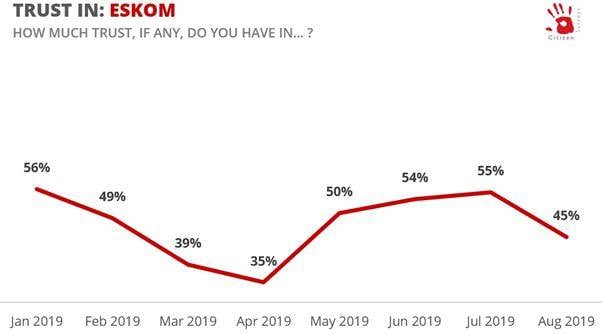Stage six loadshedding. It was a new phrase that entered South Africa’s vocabulary last night.
And South Africans were infuriated at this new level of loadshedding by power utility Eskom. Many took to social media to express their shock at Eskom’s announcement.
Eskom blamed a shortage of capacity, a technical problem at Medupi Power Station impacting additional generation supply and the “heavy rains” that have “caused coal handling and operational problems at several power stations”.
But South Africans have a different view of who’s to blame.
As the country navigates the latest stage of loadshedding reality, Citizen Surveys – a leading South African Market Research Consultancy – has collated the latest quarter 3 data from its South African Citizen Survey in an effort to determine the public’s trust in Eskom, people’s perceived direction of the country as well as who is to blame for the Eskom crisis.
According to Citizen Surveys, the data collated from face to face interviews with a national representative sample of 1300 respondents aged 18 years and older, “23% of South Africans blamed the Eskom leadership for not doing their job properly”.
“Asked ‘who is to blame for the Eskom crisis?’ individuals, who provided more than one response to this multiple response question, also blamed former president Jacob Zuma and President Cyril Ramaphosa for the crisis.
“About 22% blamed the ANC government, and 13% blamed the municipalities that don’t pay Eskom”.
This question was, according to Reza Omar, strategic research director at Citizen Surveys, asked to participants in April, a month after the national stage four loadshedding period.
“A month after loadshedding happened we asked who was to blame for all of this,” he told City Press.
“21% said that the trouble emanated from state capture. Many believe that the theft of Eskom money was to blame.”
In October, President Cyril Ramaphosa called out municipalities and large settlements including Soweto for not paying their electricity bills.
Municipalities that came under the spotlight included Free State’s Maluti-A-Phofung, Emalahleni in Mpumalanga and Emfuleni in Gauteng. At the time these were reported as the top three municipalities that owed the most debt to Eskom.
This week City Press reported how Eskom, which last week again saw a collapse of its power network that led to nationwide loadshedding, wants consumers to cough up an additional R27 billion for electricity.
On the question of how much trust South Africans had in the state-owned entity, participants were asked “How much trust, if any, do you have in Eskom.”
The trust South Africans had in the power utility, according to Citizen Surveys reached its lowest in April with only 35% saying they had any trust at all.
According to Citizen Surveys “at the beginning of 2019, nearly six in ten (56%) of South Africans trusted Eskom.”
“When Eskom started load-shedding in February, trust in Eskom began to decline. At that point just less than half of South Africans trusted Eskom. In March 2019 stage 4 loadshedding saw trust in the state-owned enterprise drop to 39% and then down to its lowest point, 35% in April.”
The organisation added that following elections, “South Africans believed that the country was being put on the right track. Trust in Eskom rose in the following three months, returning to the 55% mark in July.”
This however quickly fizzled when in August Finance Minister Tito Mboweni announced the economic strategy, detailing that Eskom required R128 billion support over three years – “money that would ultimately be extracted from South Africans via tax.”
“South Africans have very little belief that the country is heading in the right direction,” Omar said.
According to Omar, since May, there has been a steady decline in the percentage of people who believe that the country was heading in the right direction.
“We asked participants, ‘would you say the country is going in the right direction?’” he said.
“There is a clear drop from 38% after elections this year to 35% in the middle of the year and even further down to 27% in August which coincided with the announcement of Eskom’s R59 billion appropriation bill.”
Following his announcement of the bill at the time, City Press reported that Mboweni conceded that the additional R59 billion required by Eskom to stay afloat would come at “a significant cost” to South African taxpayers.
Omar added: “If you look at what happened in terms of whether or not people believed the country was heading in the right direction in March, only 22% believed that it was. The national stage 4 loadshedding in March negatively affected South African’s belief that the country was heading in the right direction.”
At the time, the country stage four loadshedding in the country was unheard of.
While the country was reeling from Eskom’ announcement of stage 6 loadshedding, reports that Ramaphosa would be leaving for Egypt on an “official visit” received mixed reactions from South Africans who called for the president to play a role in resolving the electricity crisis.
However, on Tuesday our sister publication News24 reported that the Presidency had confirmed that President Cyril Ramaphosa is set to cut his trip to Egypt short, returning home to deal with the ongoing power crisis.
 | ||||||||||||||||||||||||||
Get in touchCity Press | ||||||||||||||||||||||||||
| ||||||||||||||||||||||||||
| Rise above the clutter | Choose your news | City Press in your inbox | ||||||||||||||||||||||||||
| City Press is an agenda-setting South African news brand that publishes across platforms. Its flagship print edition is distributed on a Sunday. |




 Publications
Publications
 Partners
Partners











